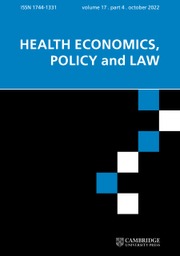Article contents
Employer-provided health insurance and hospital mergers
Published online by Cambridge University Press: 25 January 2013
Abstract
This paper explores the impact of employer-provided health insurance on hospital competition and hospital mergers. Under employer-provided health insurance, employer executives act as agents for their employees in selecting health insurance options for their firm. The paper investigates whether a merger of hospitals favored by executives will result in a larger price increase than a merger of competing hospitals elsewhere. This is found to be the case even when the executive has the same opportunity cost of travel as her employees and even when the executive is the sole owner of the firm, retaining all profits. This is consistent with the Federal Trade Commission's findings in its challenge of Evanston Northwestern Healthcare's acquisition of Highland Park Hospital. Implications of the model are further tested with executive location data and hospital data from Florida and Texas.
- Type
- Articles
- Information
- Copyright
- Copyright © Cambridge University Press 2013
References
- 3
- Cited by




